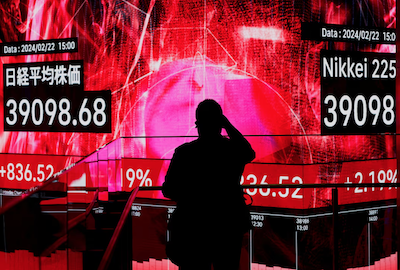Asian stock markets fell on Monday as fresh uncertainty over federal interest rate cuts dampened sentiment and the holding of a general election in France sparked widespread political concern.
MSCI’s broadest index of Asia-Pacific shares ex-Japan fell 0.33% despite thin trading due to market holidays in Australia, China, Hong Kong and Taiwan.
But Japan’s Nikkei average bucked the trend as a weaker yen boosted export-related stocks and higher domestic yields lifted financial stocks.
Also reported by AF: European countries pursue Chinese EV factories as EU eyes tariffs
The Nikkei Stock Average rose 0.92% to 39,038.16, its highest close since May 23, while the Tokyo Stock Price Index rose 1% to 2,782.49.
The Nikkei average has struggled to hold above 39,000 in recent months, falling from an all-time high of 41,087.75 hit earlier this year. Overseas investors, whose renewed interest in the market had been driving momentum, have retreated in recent weeks.
Insurance and banking stocks lifted the index, with Dai-ichi Life Holdings Inc. leading the way with a 3.6% gain. Stocks were also boosted by a rise in Japanese government bond yields following Friday’s release of employment data, tracking those of U.S. Treasuries.
The better-than-expected data also prompted a rebound in the dollar, which traded around 157.07 yen during trading hours.
That helped push export-related stocks such as Toyota Motor Corp., which tend to benefit from weaker domestic currencies, up 1.7%.
An eventful week
The halting of Asia’s risk rally came as data highlighted the resilience of the U.S. labor market.
Futures markets are pricing in about 36 basis points (bps) of Fed rate cuts, down from 50 bps last week, and the likelihood of an easing cycle starting in September is also increasing.
The latest developments come ahead of the Fed’s policy decision on Wednesday, shortly before the release of US inflation data for May.
“It would be very difficult to continue to predict three rate cuts from the Fed this year,” said Rob Carnell, head of Asia Pacific research at ING.
“The most likely outcome is that three will be reduced to two, but it’s possible that it will just be reduced to one.”
Meanwhile, the Bank of Japan (BOJ) is also holding a two-day monetary policy meeting this week and may provide new guidance on its plans to scale back its large-scale bond purchases.
France’s shocking election
French President Emmanuel Macron on Sunday declared early parliamentary elections would be held later this month following the country’s crushing defeat in the European Union membership vote to Marine Le Pen’s far-right party.
Macron’s shocking decision cause a political upheaval In France, it gave the far-right, long on the sidelines, a chance to seize real political power, threatening to nullify the presidency three years before the end of its term.
The euro plunged to its lowest in a month following the announcement, last trading 0.5% at $1.0749, amid growing uncertainty over the future political direction of Europe.
Futures also fell, with Euro Stoxx 50 futures down 0.42%, French government bond futures down 0.3%, and FTSE futures down 0.7%.
U.S. stock futures also pointed to a weak start on Wall Street.
“The market moves reflect the situation in Europe, with the news from France creating a risk premium for European assets,” said Mark Dowding, chief investment officer at BlueBay Asset Management.
“Further fluctuations are possible, but we need to remember that this is a parliamentary election, not a French presidential election.”
main character:
Tokyo – Nikkei Stock Average > Up 0.92% to 39,038.16 (closing price)
Hong Kong – Hang Seng Index <> Close
Shanghai – Composite <> Finished
LONDON – FTSE 100 down <0.35% to 8,216.37 (1040 GMT)
New York – Dow < down 0.22% to 38,798.99 (Friday close)
- Additional editing by Vishakha Saxena, Reuters

